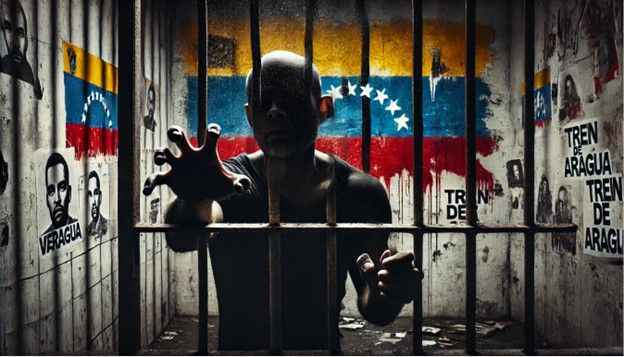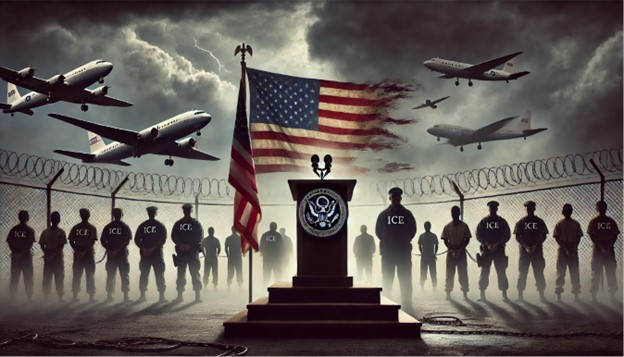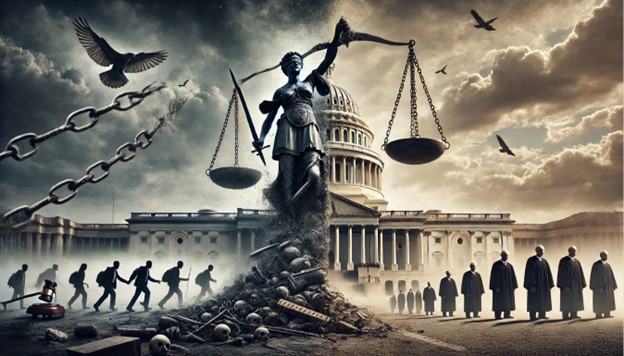Deportation Without Due Process: How Trump’s Use of the Alien Enemies Act Sparked a Constitutional Crisis
Input
Modified
A Gang, a Law, and a Campaign Message The Courts Intervene, but the Planes Keep Flying Constitutional Flashpoint: Can Wartime Powers Override Modern Law?

A Gang, a Law, and a Campaign Message
One of the most contentious decisions of his second term was made by President Donald J. Trump on a peaceful Saturday morning in March 2025. Trump, flanked by immigration officials and American flags, proclaimed the activation of the Alien Enemies Act, a rarely used law from 1798, while standing at a podium. The statute, which was last used during World War II, was unexpectedly reinstated and was being employed to deport hundreds of Venezuelan nationals who were suspected of being involved in the Tren de Aragua, a violent transnational gang that originated in Venezuela's disintegrating prison system.
The transition was planned to be swift and veiled in secrecy. Within hours, planes were departing U.S. military bases with shackled individuals bound for El Salvador. A contentious agreement with President Nayib Bukele guaranteed that they would be housed in the country's notorious Terrorism Confinement Center (CECOT), a mega-prison renowned for its overcrowding and human rights violations.
However, the deportations were not merely logistical concerns; they also sparked a constitutional crisis, which pitted the executive branch against the federal judiciary in a dispute over the rule of law, due process, and presidential power.
The Tren de Aragua, or TdA, is not your typical gang. It originated in 2014 as a criminal organization that operated within Venezuela's prisons; however, it rapidly expanded into a vast, ruthless syndicate. From within the Aragua state prison, its commanders conducted human smuggling rings, drug trafficking operations, and extortion schemes. TdA expanded its presence throughout Latin America, frequently recruiting members from the Venezuelan diaspora, as Venezuela's economy declined and millions fled the country.
The organization had expanded to the United States, Chile, Peru, and Colombia by 2023. According to U.S. officials, the gang's members were involved in violent crimes throughout the nation, such as robberies, weapons trafficking, and at least one homicide in Florida. An incident in Aurora, Colorado, in which alleged TdA members occupied an apartment building and engaged in a shootout, rapidly became a viral symbol of Trump's campaign narrative.
Trump capitalized on the opportunity. At a campaign visit in Colorado, he declared, "We are under invasion." "We are not merely receiving migrants; we are also receiving terrorists." TdA became a rallying cry, a watchword, and, in the end, the legal justification for radical immigration enforcement in his speeches.
Although the Biden administration had already classified TdA as a transnational criminal organization, Trump went one step further. He pursued instruments that would enable him to act unilaterally upon his return to the Oval Office. The Alien Enemies Act, a 226-year-old statute that was intended to remove nationals of hostile nations during hostilities, provided an ideal solution, albeit one that was constitutionally questionable.
In March 2025, his proclamation stated that any Venezuelan over the age of 14 who was not a U.S. citizen or green card holder was subject to being "arrested, restrained, secured, and removed." There were no proceedings. There are no trials. Deportation is the sole option.

The Courts Intervene, but the Planes Keep Flying
Civil liberties organizations emerged within days of the deportations. The American Civil Liberties Union (ACLU) and Democracy Forward filed emergency litigation, contending that Trump's mass removals infringed upon constitutional rights, particularly the Fifth Amendment's guarantee of due process. Federal judge James Boasberg issued a temporary restraining order (TRO) on March 15, 2025, which halted further removals under the Alien Enemies Act and demanded a comprehensive legal review.
However, the administration did not cease.
Two flights had already departed U.S. airspace, transporting deportees to El Salvador. The plaintiffs dispute the DOJ's assertion that the flights had already departed U.S. jurisdiction prior to Boasberg's order, despite the fact that the DOJ subsequently acknowledged the flights' occurrence.
Boasberg encountered an impenetrable barrier when he requested additional information from the administration. The Justice Department declined to comply, citing the state secrets privilege, a legal doctrine that is typically reserved for safeguarding highly classified information from public disclosure. DOJ attorneys contended that disclosing additional information would compromise diplomatic relations and counterterrorism operations.
Legal professionals were taken aback. It was never intended for the privilege to provide blanket immunity for executive action or to conceal violations of court orders, they claimed. One constitutional scholar observed, "This is not about state secrets." "This pertains to executive defiance."
Boasberg extended the restraining order and scheduled hearings to ascertain whether the administration had violated the law as deportation continued in defiance of court orders.
In the interim, instances emerged that called into doubt the veracity of the government's accusations. In one instance, a Venezuelan juvenile soccer coach was deported due to a tattoo of a crown that agents interpreted as a gang symbol. His attorneys maintained that the tattoo was indicative of his affection for the Real Madrid soccer team.
These narratives sparked concerns that Trump's policy was not aimed at criminals, but rather at profiling innocent individuals based on their accents, communities, or tattoos.
The case was reviewed by a three-judge panel in the D.C. Circuit Court of Appeals. Judge Patricia Millett delivered a vehement critique of the administration's disregard for due process during the oral arguments.
"The Alien Enemies Act resulted in more favorable treatment for Nazis," Millett stated. "At least they had hearing boards." They received notification. Nothing exists in this location. Individuals are merely carried onto aircraft and transported to distant destinations.
While DOJ attorney Drew Ensign contended that no such notice was necessary, Millett persisted. "You are implying that individuals may be deported without being informed of the reason?" She inquired. "That is not equitable." Judge Justin Walker, a Trump appointee, appeared to be more receptive to the administration's assertions; however, he also acknowledged that individuals must have a means to contest their removal. He recommended that such cases be presented in district courts located in close proximity to the detainees' locations. However, as ACLU attorney Lee Gelernt noted, the individual has already passed away by the time a case of this nature is filed, and the damage is irreversible.

Constitutional Flashpoint: Can Wartime Powers Override Modern Law?
The issue at hand is no longer solely about immigration enforcement; it is now about the president's ability to undermine the judiciary by utilizing state secrets and wartime powers in non-war scenarios.
Judge Boasberg's provisional restraining order was scheduled to expire at the end of March. He granted the plaintiffs until Wednesday to submit a preliminary injunction, a more potent legal instrument that could be appealed if necessary. Both parties seem prepared to escalate the conflict to the Supreme Court, potentially redefining the balance of power between the branches of government.
Legal professionals are issuing a warning. "If the courts permit this," stated a law professor, "we will have established a precedent that any president can declare a group an enemy and deprive them of their rights without any oversight."
There are those who are concerned about the precedent that is being established for the future use of the Alien Enemies Act, a law that was enacted in a different era and is currently being implemented without guardrails, hearings, or evidence standards.
Secretary of State Marco Rubio defended the administration's actions in public remarks, dismissing criticisms as "activist hysteria" and citing urgent national security threats. He verified that the administration had reached an agreement with El Salvador to house deportees under a prisoner swap arrangement, describing it as "a model for future enforcement."
However, the process has been anything but orderly for the individuals who have already been deported and those who are at risk of being removed in the future. Some individuals are unaware of the charges against them. Lawyers are unavailable to others. Additionally, their prospects of returning home or communicating with their families are exceedingly low once they are incarcerated in Salvadoran prisons.
The future of how America balances security and civil liberties in a moment of severe polarization will be determined by the outcome of the upcoming court cases, which will also affect the fate of hundreds of Venezuelan migrants. Is it possible for a president to unilaterally reinstate wartime powers in order to circumvent contemporary laws? Is it possible for courts to enforce their orders if the executive merely declares them irrelevant?
One thing is certain: what began as a response to a violent gang has evolved into a conflict over the very essence of American constitutional democracy. The resolution may be contingent upon the willingness of courts, legislators, and citizens to demand that no one, not even a president, is above the law, in addition to the facts.





















